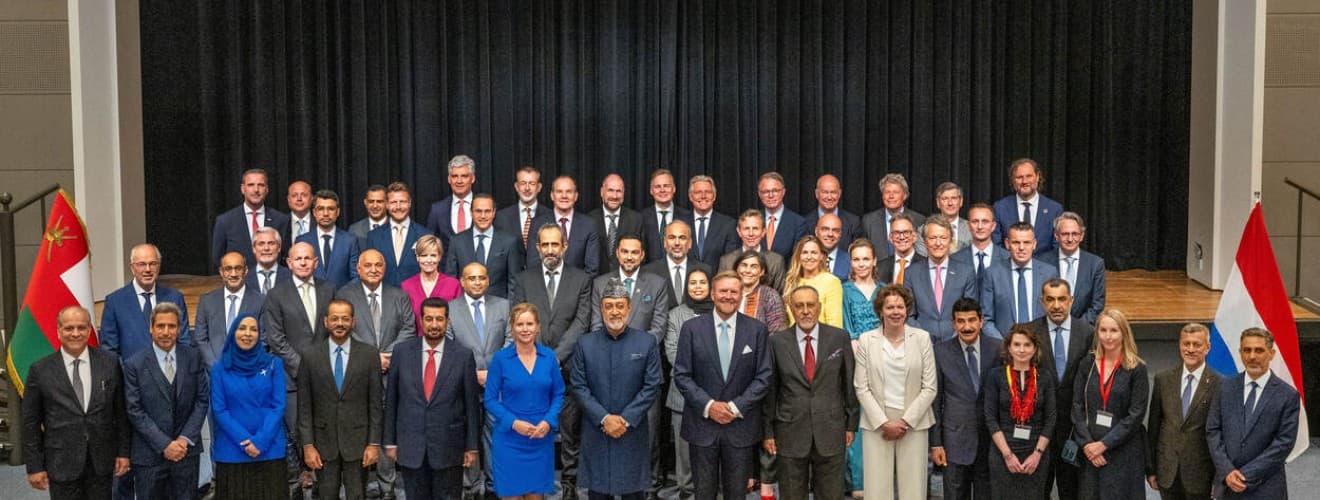Oman, Netherlands, Germany sign historic hydrogen deal
Oman, Netherlands, and Germany sign deal for world's first liquid hydrogen corridor. Green energy for Europe by 2029.
Published on April 17, 2025

Team IO+ selects and features the most important news stories on innovation and technology, carefully curated by our editors.
A groundbreaking Joint Development Agreement (JDA) has been signed to establish the world’s first liquid hydrogen import corridor, connecting the Sultanate of Oman, the Netherlands, and Germany. This corridor will link the port of Duqm in Oman, the port of Amsterdam in the Netherlands, and key logistics hubs in Germany, including the port of Duisburg, enabling the commercial-scale import of renewable fuel of non-biological origin (RFNBO) compliant liquid hydrogen to Europe. The agreement was signed during the state visit by His Majesty the Sultan of Oman to the Netherlands.
Key elements of the agreement
The agreement was signed by eleven parties, including prominent players such as Hydrom, Oman’s national green hydrogen orchestrator, OQ, Oman’s global integrated energy group, Tata Steel Nederland, Hamburger Hafen und Logistik AG, and Hynetwork. This collaboration brings together all the critical links for the envisioned supply chain, capitalizing on proven technologies for the liquefaction, transport, storage, and distribution of liquid hydrogen.
ECOLOG’s advanced vessel design ensures net-zero boil-off, eliminating cargo loss in marine transportation. This transformative innovation significantly reduces unit freight costs, setting a new standard for efficiency and sustainability.
The agreement comprises several key components vital to the corridor’s development:
- Development of Centralized Facilities: A centralized liquefaction, storage, and export facility will be developed at the port of Duqm, one of the hubs for Omani-produced green hydrogen.
- Pricing and Delivery Discussions: Talks will be held on the pricing and delivery of liquid hydrogen to offtakers located in the broader Amsterdam area, as well as other locations in the Netherlands and Germany, with EnBW acting as the aggregator.
- Infrastructure Development: Dedicated infrastructure will be developed throughout the corridor, including export and import facilities in the ports of Duqm, Amsterdam, and Duisburg. This will also include various distribution modalities for gaseous and liquid hydrogen, such as gas pipeline networks, rail connections, and barge distribution leveraging the Netherlands' extensive canal network.
A step toward global hydrogen leadership
This agreement marks a significant step in Oman’s ambition to become a global leader in the green hydrogen export market while strengthening Europe’s energy security. The initiative supports the EU’s clean energy goals, helping to decarbonize hard-to-abate sectors such as steelmaking and transport.
“This agreement represents a landmark moment in our commitment to clean energy,” said Ms. Sophie Hermans, the Dutch Minister for Climate and Green Growth. “By linking Omani green hydrogen with Europe’s energy needs, we are advancing our shared climate goals and creating a sustainable energy pathway.”
Oman’s Minister of Energy and Minerals, H.E. Eng. Salim Nasser Al Aufi added, “This partnership reflects Oman’s commitment to playing a leading role in the global green hydrogen economy while strengthening ties with Europe to support its sustainable clean energy transition.”
The JDA builds on the existing partnership between Hydrom, the Omani Ministry of Energy and Minerals, Port of Amsterdam, ECOLOG, and EnBW for the development of the liquid hydrogen corridor. This latest development brings the project one step closer to delivering large-scale green hydrogen volumes from Oman to Europe by 2029.
